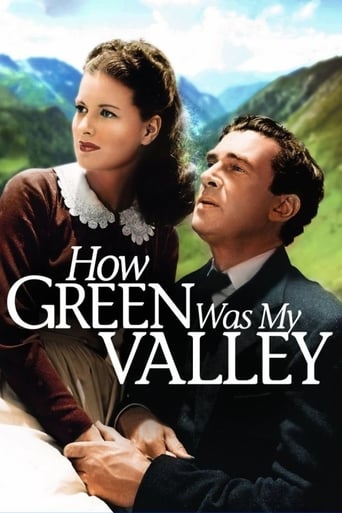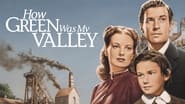steve_jm_kidd
How Green Was My Valley is a bit like one of those books you have to read at school, but don't really want to and don't enjoy as much as you should. Altogether too twee, and whereas things like Lassie Come Home and Mrs Miniver tug the heartstrings to breaking point this seems a deal, clumsier? (That's not the right word, perhaps reckless might be a better term) The thing is, it pertains to being right-on, it could have been an incredible ecological pioneer, and begins as if it is going to be, but falters from the get go. It could be a tribute to the working man, but it is unconvincing. It could be an homage to Wales but it is a load of Yanks in a studio with California backgrounds*. It could have been a counterpoint to Goodbye Mr Chips, but it ended up just with a short but total indictment of teachers whilst forgetting the system. Most of all it could be an epic on rational economics but it never actually makes its mind up enough to get started. Its loudest clarion is for that oxymoron 'sensible religion', so all in all, I was happy to watch it from the point of cinema history, but I enjoyed my sweet potato fries with coconut and mushroom sauce a deal more. (The food got a 7.7). The Hayes code has got a lot to answer for. I wonder if William Wyler would have done it better?* Called that before I read it "Fox wanted to shoot the movie in Wales in Technicolor, but events in Europe during World War II made this impossible. Instead, Ford had the studio build an 80 acre authentic replica of a Welsh mining town at Brent's Crags (subsequently Crags Country Club) in the Santa Monica Mountains near Malibu, California. The cast had one Welsh actor, Rhys Williams, in a minor role." (Wikipedia)If you do watch this listen for the cast all conjugating sentences like Yoda! "How green was my Valley that day, too, green and bright in the sun."
bigverybadtom
Admittedly I watched this with the idea that this movie was such a classic and had great performers in it. It wasn't quite as good as I had expected.People have panned this for the performers not having proper Welsh accents or the scenario looking too much like California. But the truth is that even without World War Two going on, the Hollywood film industry was actually in bad financial shape during the Great Depression like everybody else, and it would have been too expensive and difficult to make everything properly look and sound like Wales, let alone go on location. The idea was to show essentially a poor mining town, even if the settings didn't match the interiors of actual Welsh houses.I have not seen the book, so I cannot say how well the movie follows it. Admittedly the major problem was that the script was rather disjointed. It starts off with the protagonist talking about leaving his village and describing how it was when he was growing up. The first part has the miners going on strike when their wages are cut, and the father denounces the idea of his sons joining a labor union (though not explaining why). Later on, the mine owner's son wants to marry the family's daughter, and she is in love with the local preacher but marries the son anyway. Huw, the son who tells the story, is sent to the local school, gets bullied by classmates and teacher, fights back, and eventually graduates with honors, but chooses to work in the mine. That is never explained either.The movie's fundamental problem is that things happen one after another, but without explanations about people's attitudes and why they are what they are, or why people make certain choices which seem illogical. In the end, we don't even know why the protagonist finally leaves the valley when he does, or what he plans to do.
grantss
Interesting look at life in Welsh coal-mining town in the early- 1900s.The story of a family, the Morgans, who live in a Welsh coal-mining town, told through the eyes of the youngest son, Huw (played by a 12-year old Roddy MacDowall). The father and four oldest sons all work in the colliery. Pretty much everything centres around the colliery - it is the life blood of the town, and the source of pain, ill-will and death. In addition, we see the relationships between the people in the town, how they develop and change. An interesting drama, showing the social impact on a town when it is dependent entirely on a single industry. The relationship side is interesting too. However, in trying to cover as much of what happens in the town as possible, there is a lack of focus. While the ending is reasonably profound, a much greater point could have been made. The landing is a bit soft.Great performances all round.How Green Was My Valley went on to win the 1942 Best Picture Oscar, beating out Citizen Kane (amongst others) to the award. Not that it is better: it can probably thank William Randolph Hearst's campaign against Citizen Kane for the award.
The_Film_Cricket
What stays with me is the singing. They sing on their way to work. They sing on the way home from work. They sing at weddings, funerals, church services. They sing during downtime, during happy occasions and during sad occasions. Their singing comes in the form of choral arrangements that doesn't come from formal practice but from their very souls. When they sing it comes from the echoes of the past, of the heritage passed down from their fathers. Their singing sweeps across the hills and becomes part of their daily breath.John Ford's adaptation of Richard Llewellyn's book How Green Was My Valley is a movie about the hardships in a small 19th century mining town in Southern Wales, in which the people live in poverty and grief yet they sing all the time. Were it not from the singing this might be just another good-looking memoir, so the singing gives it texture.The movie is a memoir told from the point of view of a man who is about to leave his native land. He tells us his story in flashbacks so that we understand where he came from and why he is eventually driven to vacate. This is a mining town, but it has become so industrialized and over-populated that the place no longer resembles the land of his formative years. The story is told from the point of view of the young Huw (Roddy McDowell) as he watches the hardships within his own family. His proud father (Donald Crisp) and his mother (Sara Allgood) struggle against generational differences to hold their family together. Among the siblings are Ivor (Patric Knowles), Huw's older brother, and Angharad (Maureen O'Hara) his older sister. There is also Bronwyn, Ivor's wife whom Huw harbors a serious crush. And there's Mr. Gruffydd (Walter Pidgeon) a good-hearted minister who marries Huw's sister.The problems within the family have to do with the children's restlessness, and their desire to escape the generational heritage to find their own way in the world. The first cracks begin to form when the mine worker's pay is cut and they go on strike. The boys in the mine want a strike, but Mr. Morgan is supports the mining company and, for a short time, becomes the town pariah. This is the beginning of their problems and won't end until the Morgan children are scattered across the globe.The heritage given to the children of this town is to work in the coal mines. Everyone has their problems, whether they be marital strife, accusations by the church or simply a matter of personal difficulties that turn into life-long grievances. This is not a happy story to say the least. Even little Huw has his problems at school where an egotistical teacher makes him humiliates him in front of the class because of his low social standing.The narrative given in How Green Was My Valley feels more like pieces and short stories rather than one continuous thread. It looks and feels like pieces of memory and that would be fine if we felt any real connection with the characters. We can't help but feel for them, but while we understand their circumstances, the characters remain sort of unknown to us. We feel the texture of their location and their heritage, but the individuals are missing. There are things in the movie that work. John Ford creates a sense of time and place and of memories. We feel that these are events that are being looked back on, but something in the intimate detail is simply not there. We reach for the emotional pull but our hands grasp at empty air.Possibly for that reason, the film's historical legacy is not so great. Despite being acclaimed at the time, earning ten Oscar nominations and taking home the prize for Best Picture, How Green Was My Valley has more or less faded into obscurity. It is rarely screened on television except in the occasional annual Oscar marathon and even then only rarely does it show up. That could be because the film doesn't really reach out to the viewer. The involvement factor remains somewhat at arms-length. Well-made as it is, the movie feels like homework. It is not the first John Ford movie that you reach for or even the second or third or fourth. This is a film with just as many things that work as things that don't. There are elements that stay with me, but as a whole, it doesn't.






